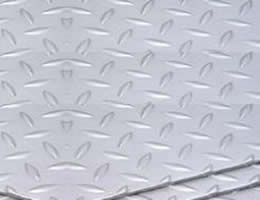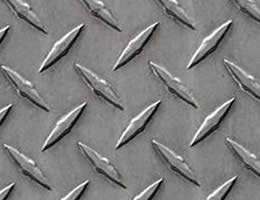How to Choose Checkered Plate Materials: Aluminum or Steel?
Checkered plates can be made from a wide range of metals and alloys while aluminum and steel (carbon steel and ss) are mostly used. Each has different features and uses, comparing as follows.
Checkered Aluminum Materials:
Checkered Aluminum Alloy Materials can be divided into 13 types while 4 of them are popularly used in checkered plates processing
Aluminum Alloy Types:
1050/1060/1070/1100/1200/1350/3003/3004/3105/5005/5052/5754/5083
Aluminum Plate Thickness: 0.2--20.0mm
Plate Roll Width: 500-1500mm
Temper: O/H12/H22/H14/H24/H16/H26/H18
Detail Features and Uses of Popular Aluminum Alloy Materials to Be Checkered:
1100 Aluminum Sheet: Low strength aluminum alloy has excellent corrosion resistance and satisfactory anodizing and conversion coating finishing characteristics. It is unmatched by any other commercial aluminum alloy in workability. Readily to welding, brazing, and soldering. Machinability is poor and tends to be "gummy". Non-heat treatable. Typical applications include chemical storage, processing equipment, kitchen utensils, and general sheet metal work.
3003 Aluminum Sheet: Approx. 20% higher strength than the 1100 series, but retaining an excellent workability rating. May show some slight discoloration when anodized, but reacts well to mechanical and organic finishings. 3003 is easily welded and brazed, but solder is limited to the torch method. Like 1100, tends to be "gummy" when machined. Non-heat treatable. Typical applications include food and chemical equipment, appliance components, truck and trailer roofing, heat exchangers, and lawn furniture components.
5083 Aluminum Sheet: With excellent corrosion resistance and weldability, together with high strength, this alloy was designed for welded structures requiring maximum joint strength and efficiency. Can be anodized for increased corrosion resistance, but does not lend itself to decorative applications. Not meant to be a machining alloy, but can be machined fairly well with proper preparations. Because of its relatively high magnesium content, the workability rating would only be fair. Non-heat treatable. Typical applications include large marine craft, containers, railroad cars, structures and elevator cars.
5454 Aluminum Sheet: Excellent corrosion resistance and, unlike the other magnesium alloys, it maintains that rating when functioning in the 150-300 degrees F range where the others would be prone to stress corrosion. Not a decorative alloy but well adapted to the applied finishing processes. High strength, excellent weldability, fair formability, and poor machinability. Non-heat treatable. Typical applications include dump bodies, exhaust stacks, marine components, and chemical handling vessels.
Checkered Steel Plate Materials: including checkered carbon steel and stainless steel.
Checkered Carbon Steel materials can be divided into following grades: A36,SS400,SPCC,SPHC, Q195, Q 235,Q345, AH36,A283,S235J1/S235J2/S235JR, S275J1/S275J2/S275JR, A516 Gr.60/A516 Gr.70, ST37-2
Checkered Stainless Steel Materials:
Major stainless steel sheet material: SS 300 series, 200 series and 400 series. 200 series: 201,202.
300 series: 301,304,304H,304N,304L,304LN,309S, 310S,316,316Ti,316L,316N,316LN,317,
317L,321,321H,347,347H.
400 series: 405,409,403, 430,410,420, 440c.
Stainless steel has good mechanical properties with including excellent corrosion resistance, heat resistance.
 |
 |
| Aluminum Floor Plate 3003 Grade, Diamond Plate | 304 Steel Grade Chequer Plate, One Bar |

